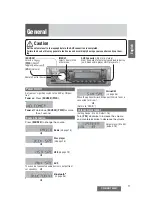
MC500
RollCall Control Panel Channel Operation Screens
Issue 1 Rev 6
Page 112
© 2015 SAM
•
Enhanced De-interlace:
Replaces missing lines with a gradient between the
previous and following lines. This control improves the appearance of de-interlaced
images and is useful when dealing with complex shapes.
For more information about motion processing and enhanced film settings, see the
KudosPro
Still Mode Application Note
and
KudosPro Film Mode Application Note
, under the “Support”
tab at:
www.snellgroup.com/products/conversion-and-restoration/conversion/kudospro/
11.4.3 Input Cadence
Input Cadence enables you to define any cadence associated with the input video.
•
Film Cadence:
Enables the processing of film-originated content transported by a
cadence.
•
59 Cadence:
For standards with a field rate of 59 Hz and with cadence enabled, you
can choose either 2:2 or 2:3 (psf).
Note: Standards with field rate of 50 Hz and with cadence enabled are interpreted as
2:2.
•
2:3 Source:
Selects whether a 2:3 cadence is determined automatically or derived
from the input timecode.
•
Automatic:
The cadence detection circuit automatically detects the cadence.
This is useful when the source material contains mixed cadences.
•
Input Timecode:
Defines the relationship between timecode and the 2:3
sequence. This is useful when the source material contains known, continuous
2:3.
•
2:3 Start Hour:
Sets the starting hour for the timecode (when 2:3 Source is set to
Input Timecode). The adjustment range is from hour 0 to hour 23 in one-hour steps.
11.4.4 Output Cadence
Output Cadence enables you to define the required cadence of the output video.
•
Film Cadence:
Enables the cadence of the output content.
•
59 Cadence:
For standards with a field rate of 59 Hz, you can choose either 2:2 or 2:3
(psf) cadence generation.
Note: Standards with field rate of 50 Hz are interpreted as 2:2.
•
2:3 Source:
Selects whether a 2:3 cadence is free-running or derived from the output
timecode.
•
Free Run:
In Free Run mode the output 2:3 cadence is undefined. The output
will have continuous 2:3, but may vary from conversion to conversion.
•
Output Timecode:
Defines the point at which the 2:3 sequence starts relative to
timecode.
•
2:3 Start Hour:
Sets the starting hour for the timecode (when 2:3 Source is set to
Output Timecode). The adjustment range is from hour 0 to hour 23 in one-hour steps.
















































